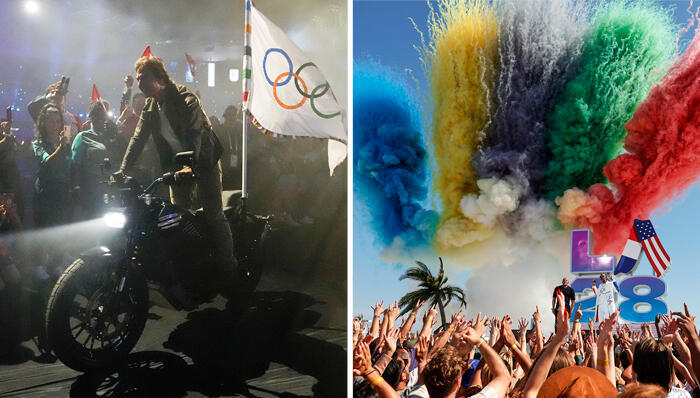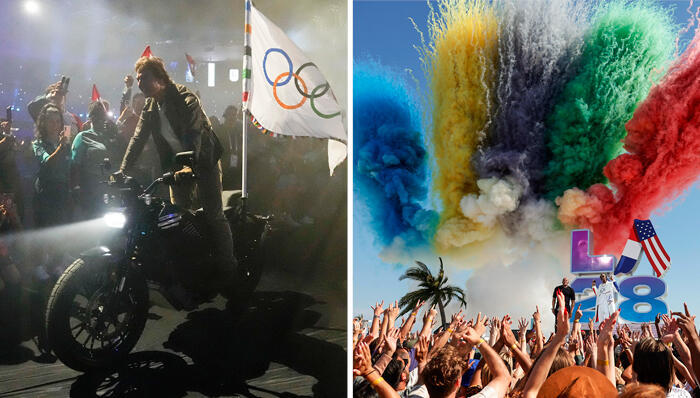
LA takes the torch: preparing for the 2028 Olympics
Top celebrities were recruited for the closing ceremony of the Paris Olympics, which included the transfer of the Olympic flag to the next host city - Los Angeles, which must grapple with its poor public transportation, homelessness, and security concerns as it prepares to host the world.
At the closing ceremony of the Paris Olympic Games, the Olympic flag was handed over to the host of the 2028 Olympics: Los Angeles. In true Hollywood fashion, Tom Cruise leapt from the roof of the Stade de France, secured by a rope, to take the Olympic flag from Los Angeles Mayor Karen Bass and the world's most decorated gymnast, Simone Biles, before driving off on a motorcycle.
Later, in a pre-recorded video, Cruise rode into the belly of a plane, and parachuted to the famous Hollywood sign, before passing the flag to a chain of athletes with Star Wars theme music playing in the background. The video ended at Venice Beach, where an excited crowd surrounds an improvised stage featuring Snoop Dogg, Dr. Dre, the Red Hot Chili Peppers, and Billie Eilish.
1 View gallery


Tom Cruise at the Olympics and celebrations in LA.
(Credit: Emma McIntyre/Getty Images AP Photo/Ashley Landis)
Los Angeles now has four short years to prepare to host the world's largest sporting event, branded simply as LA28. "We want our Games to be modern, youthful, and full of the optimism that Southern California brings to the world," said Janet Evans, a four-time Olympic gold medalist in swimming and Chief Athlete Officer of the LA28 Organizing Committee.
Since winning the tender in 2017, the city has made sure to refer to their unique tradition of hosting the games. This will be its third time, an honor held by only two other cities - Paris and London. Therefore, the organizing committee explained, Los Angeles is not required to build new facilities like Paris. Instead, dozens of existing sites will be designated for reuse. Among other things, the LA Memorial Coliseum will host athletics events as it did in the two previous Olympics. The student dorms at UCLA will be converted into the Olympic Village. "These are games without construction," Evans said.
What perhaps highlights the significant difference between the last host city, Paris - 500 years old and rich in history and culture - and LA - the City of Stars and tech - are the names of the venues that will host two of the most popular sports: SoFi Stadium, named after the fintech company, will be converted into the swimming venue, while Crypto.com Arena will host the gymnastics competitions. "We don't have the Eiffel Tower," said Casey Wasserman, Chairman of LA28, but "we have the Hollywood sign, and we have amazing places."
No breakdancing, but baseball and cricket
Even though the city has experience hosting the Games, much has changed in the 44 years since they last hosted them. Each time, the games have grown larger and more ambitious, driven by the friendly rivalry between cities to make their mark. The first time Los Angeles hosted the Games in 1932 (during the Great Depression), 1,332 athletes competed.
The second time was in 1984, when the number of athletes soared to 6,829 (and that's after the Soviet Union boycotted the Games). Nearly 11,000 athletes competed in the Paris Olympics across 48 different sporting events, ranging from rugby to equestrian jumping, track and field, skateboarding, and even breakdancing - the last sport added to the Olympic Games in Paris but won’t be included at the next Olympics. Instead of breakdancing, Los Angeles is expected to bring back sports like cricket, squash, baseball, and softball.
The challenges facing the city as it prepares to host the Olympics are vast. The most recent budget update was $6.88 billion, less than Paris's budget of $9.7 billion, due to the use of existing facilities. A particularly large cost was removed from the Olympic budget after Los Angeles decided to forgo upgrading the city's rail network, which was promised as part of their bid to the Olympic Committee to host a "car-free Olympics." "We've always been in love with our cars," said Bass at a press conference last week during the flag handover, emphasizing the goal of making the Games accessible to the general public without the need for cars.
As part of this promise, the Inglewood People Mover project was launched, an automated train line with three stations connecting major Olympic venues. Initially, the city received a $1 billion federal funding commitment to complete before the Games, but various objections cut the budget, and it's unclear if it will be ready by 2028. However, a connection between downtown LA and the UCLA campus via subway is expected to be completed by 2027.
Nevertheless, transportation for millions of Olympic attendees, in a city with the among worst traffic in the world, is expected to rely mainly on an upgraded fleet of 3,000 buses borrowed from across the U.S. Bass added that officials might ask companies to have their employees work remotely during the 17 days of the Olympics. "Part of a car-free Olympics means getting people not to drive," Bass said. She added, the city is committed to "making ongoing environmental improvements" throughout Los Angeles in preparation for hosting the Games and to meet sustainability challenges.
From homelessness to national security
If that weren't complicated enough, Los Angeles also has one of the highest concentrations of homeless people in the United States. About 45,000 homeless people live in the city, compared to more than 3,500 in Paris, where, according to reports, over 12,000 people were "relocated" ahead of the Olympics (though Paris Olympic organizers denied this).
In Rio de Janeiro, about 22,000 people were removed from the city ahead of the 2016 Olympics. One study on the 1984 Los Angeles Olympics found that the incarceration rate of homeless people in the city sharply increased in the run-up to the Olympics. The chief of the LAPD was quoted a week before the opening ceremony by the LA Times saying, "We're trying to 'sanitize' the area."
Bass now has the opportunity to learn and change how the homeless are treated. Last March, the mayor promised to house all homeless individuals. "We’ll get them off the streets and put them in temporary housing, address the reason they were not housed, and move them into permanent housing," she said, explaining that affordable housing projects would also be expedited.
Over the past year, Bass has begun implementing a program called Inside Safe, which relocates the homeless to hotels and promises to find them permanent housing within six months. Since its inception in January 2023, 2,870 homeless individuals have been moved to hotels, with the program's annual cost exceeding $180 million. "These numbers aren’t sufficient," she said, "but we've proven that people are willing to leave the streets."
There are also security concerns surrounding LA28, with federal authorities designating it a Special National Security Event. This is the earliest such designation that has ever been made, even though the United States has hosted Olympic Games before, and Los Angeles itself is still set to host three major sporting events before the Olympics: matches during the 2026 FIFA World Cup, the 2026 U.S. Open Women's Tennis Championship, and the 2027 Super Bowl.
This designation means that the United States Secret Service will be responsible for securing the event. "People will feel safe in Los Angeles," said Reynolds Hoover, CEO of LA28 and a retired U.S. Army Major General, but people should not expect to see security personnel "carrying machine guns in the streets."













